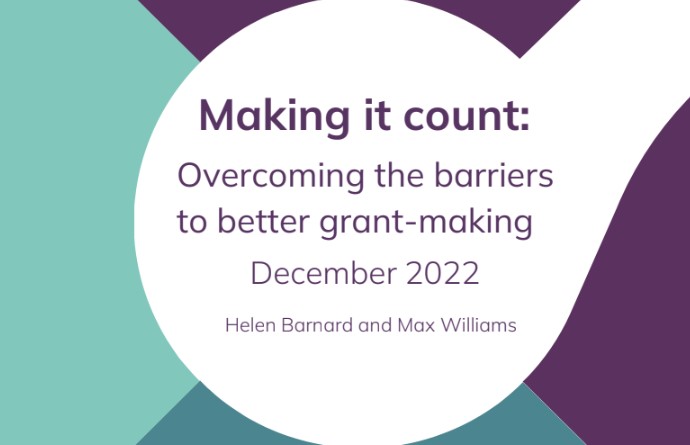An overhaul of the UK grant making system is needed to ensure it does not discriminate, is focused on long term support and is less complex and time consuming for charities.
The call has been made in a report by think tank Pro Bono Economics’ Law Family Commission on Civil Society and backed by sector leaders.
Among recommendations is for the Charity Commission to take a “pivotal role” alongside umbrella groups in the sector to improve grant making processes for charities and funders.
The report calls for the regulator to share information about “problems caused by poor grant making, what good practice looks like and the resources available to support improvements”.
The report found that currently grant making is “beset by short-termism, sub-optimal processes and the reproduction of wider social inequalities”.
It welcomes grant makers that have already improved their practice, as recommended by the Association of Charitable Foundations (ACF) ’40 pillars of stronger foundation practice’.
This includes investing in diversity, equity and inclusion resources and being transparent about funding decisions.
The report calls for more funders to follow their lead.
It is particularly critical of “the short-term basis on which grants tend to be offered” adding that funding for a year at a time or less “leads to uncertainty and leaves charities unable to plan for the future”.
In addition, grant making processes “tend to intersect and reproduce wider social inequalities” and Black and minority ethnic led charities face “especially acute struggles in accessing grants”.
It cites findings from the Funders for Race Equality Alliance that show that only 14% of £122m worth of funding went to organisations supporting ethnic minority communities.
“Sub optimal processes including complex and time-consuming grant application and monitoring processes,” are also criticised.
Other recommendations include expanding independent benchmarking across the sector and for charity sector infrastructure bodies to “increase awareness of the problems caused for charities by poor grant making”.
Pro Bono Economics research and policy director Helen Barnard said: “Although there are numerous examples of brilliant grant-makers, there is a problem with the system more widely.
“Too often, charities come up against time-consuming and costly application processes and funding that is too short-term, while grant-making decisions can reproduce wider social inequalities.
“Addressing this problem requires leadership from the Charity Commission and the sector’s various infrastructure bodies. These organisations have the influence and reach to bring lasting change which can help to unlock the full potential of grant-making in the UK.”
Grant making in 2019/20 was worth nearly a sixth of the charity sector’s overall income and the top 300 foundations in the UK account for 90% of grant making.
Sector leaders’ views on grant making
“As a sector, we know that smaller, grassroots charities can often have the greatest impact on tackling systemic inequalities facing communities, yet too often applying for grant funding can be complex and costly, which narrows the pool of opportunity,” warned NCVO chief executive Sarah Vibert, who is among sector leaders calling for improvements to grant making.
She says that grant making improved amid the pandemic as it was more flexible and funders worked more collaboratively with charities.
“This should be the basis for longer term change,” she added.
ACEVO chief executive Jane Ide said the report and its findings “are important for the development and sustainability of our sector and especially now in times of rising need and widening inequalities”.
“The issues identified are holding the sector back from making the biggest possible difference and it’s incumbent upon leaders to take action to ensure continued progress towards a more sustainable, effective and equitable sector,” she said.
ACF chief executive Carol Mack said: “Many funders are already demonstrating good grant-making practice and there is scope for this to be more widely adopted across the sector.”
She added: “Ambitious and effective practice involves understanding the effects of funding on those that foundations seek to support and seeking to avoid and redress harm.
“It also includes more positive aims, like choosing funding practice that is most likely to help foundations achieve their mission and designing processes in accordance with values. Implementing these principles will help foundations achieve even more and embed stronger practice.”
Latest News
-
King visits charity founder days before she dies to invest her as a Dame
-
2025: Most-read opinion, diaries, Q&As and more
-
Arrests made in global charity donation theft probe
-
2025: Most-read news
-
Regulator probes ‘serious and significant’ safeguarding failings at Christian charity
-
Government seeks experts to join Civil Society Covenant body
Charity Times video Q&A: In conversation with Hilda Hayo, CEO of Dementia UK
Charity Times editor, Lauren Weymouth, is joined by Dementia UK CEO, Hilda Hayo to discuss why the charity receives such high workplace satisfaction results, what a positive working culture looks like and the importance of lived experience among staff. The pair talk about challenges facing the charity, the impact felt by the pandemic and how it's striving to overcome obstacles and continue to be a highly impactful organisation for anybody affected by dementia.
Charity Times Awards 2023
Mitigating risk and reducing claims

The cost-of-living crisis is impacting charities in a number of ways, including the risks they take. Endsleigh Insurance’s* senior risk management consultant Scott Crichton joins Charity Times to discuss the ramifications of prioritising certain types of risk over others, the financial implications risk can have if not managed properly, and tips for charities to help manage those risks.
* Coming soon… Howden, the new name for Endsleigh.
* Coming soon… Howden, the new name for Endsleigh.
Better Society

© 2021 Perspective Publishing Privacy & Cookies











Recent Stories